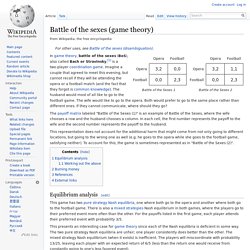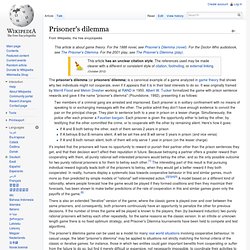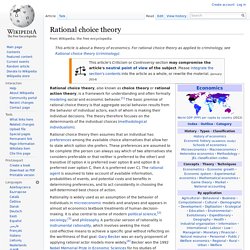

Screenside Chat 1. Battle of the sexes (game theory) The payoff matrix labeled "Battle of the Sexes (1)" is an example of Battle of the Sexes, where the wife chooses a row and the husband chooses a column.

In each cell, the first number represents the payoff to the wife and the second number represents the payoff to the husband. This representation does not account for the additional harm that might come from not only going to different locations, but going to the wrong one as well (e.g. he goes to the opera while she goes to the football game, satisfying neither).
To account for this, the game is sometimes represented as in "Battle of the Sexes (2)". This game has two pure strategy Nash equilibria, one where both go to the opera and another where both go to the football game. There is also a mixed strategies Nash equilibrium in both games, where the players go to their preferred event more often than the other. This presents an interesting case for game theory since each of the Nash equilibria is deficient in some way. . , so: Similarly: Prisoner's dilemma. The prisoner's dilemma (or prisoners' dilemma) is a canonical example of a game analyzed in game theory that shows why two individuals might not cooperate, even if it appears that it is in their best interests to do so.

It was originally framed by Merrill Flood and Melvin Dresher working at RAND in 1950. Albert W. Tucker formalized the game with prison sentence rewards and gave it the name "prisoner's dilemma" (Poundstone, 1992), presenting it as follows: Two members of a criminal gang are arrested and imprisoned. Each prisoner is in solitary confinement with no means of speaking to or exchanging messages with the other. It's implied that the prisoners will have no opportunity to reward or punish their partner other than the prison sentences they get, and that their decision won't affect their reputation in future.
The prisoner's dilemma game can be used as a model for many real world situations involving cooperative behaviour. Strategy for the classic prisoners' dilemma[edit] Nice. Www.khanacademy. Www.khanacademy. Bacteria use chat to play the 'prisoner's dilemma' game in deciding their fate. When faced with life-or-death situations, bacteria -- and maybe even human cells -- use an extremely sophisticated version of "game theory" to consider their options and decide upon the best course of action, scientists reported in San Diego March 27.

In a presentation at the 243rd National Meeting & Exposition of the American Chemical Society (ACS), they said microbes "play" a version of the classic "Prisoner's Dilemma" game. José Onuchic, Ph.D., who headed the research team, said these and other new insights into the "chat" sessions that bacteria use to communicate among themselves -- information about cell stress, the colony density (quorum-sensing peptides) and the stress status and inclinations of neighboring cells (peptide pheromones) -- could have far-reaching medical applications.
"Using this form of cell-to-cell communication, colonies of billions or trillions of bacteria can literally reach a consensus on actions that impact people," Onuchic explained. Mbaecon.wikispaces. Rational choice theory. Rationality is widely used as an assumption of the behavior of individuals in microeconomic models and analyses and appears in almost all economics textbook treatments of human decision-making.

It is also central to some of modern political science,[2] sociology,[3] and philosophy. A particular version of rationality is instrumental rationality, which involves seeking the most cost-effective means to achieve a specific goal without reflecting on the worthiness of that goal. Gary Becker was an early proponent of applying rational actor models more widely.[4] Becker won the 1992 Nobel Memorial Prize in Economic Sciences for his studies of discrimination, crime, and human capital.[5] Definition and scope[edit] The concept of rationality used in rational choice theory is different from the colloquial and most philosophical use of the word. Rational choice theorists do not claim that the theory describes the choice process, but rather that it predicts the outcome and pattern of choices.